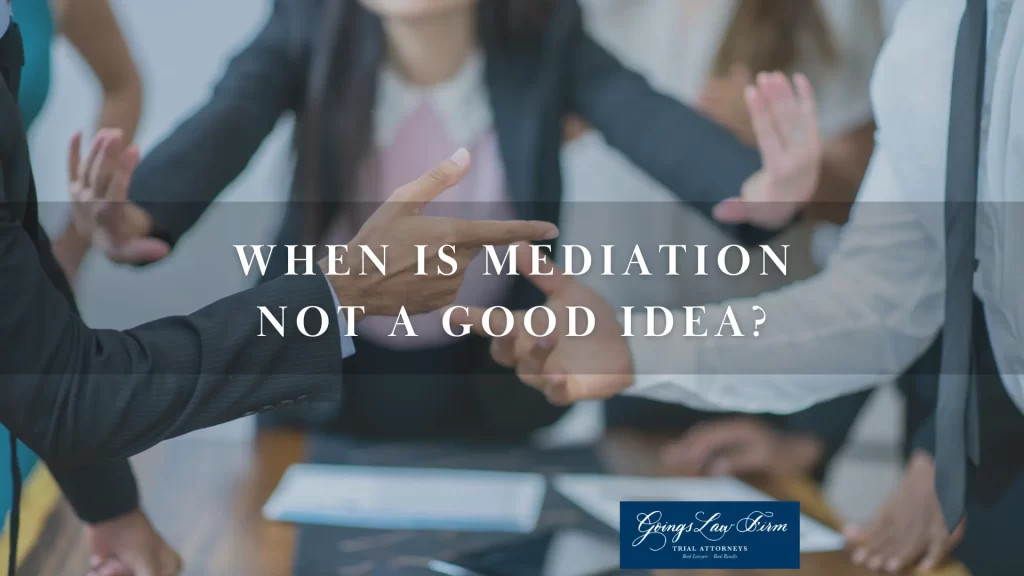

Mediation has many benefits, which is why it has become a popular form of dispute resolution for lawsuits. However, sometimes mediation may not be a good idea.
What Is Mediation?
Mediation is a process that may be voluntarily entered by the parties or required through a court order. Mediation aims to reach a mutually agreed-upon resolution to save the time and money required if the lawsuit goes to trial. During mediation, an impartial third party will be present to help guide the conversation and keep it cooperative rather than hostile and uncooperative.
Mediation is most successful when both parties can agree on what they are trying to accomplish and are willing to make some compromises. Conversely, when parties are unwilling to compromise, mediation will likely fail, and the lawsuit will end up at trial anyway.
Read more: How Mediation Works in Personal Injury Cases
Benefits of Mediation
Plaintiffs, defendants, and even judges tend to like mediation because there are many benefits to mediating a case.
It Saves Time
Often, mediation can help parties reach an agreement in one or two sessions, each usually taking between three and four hours. This means that one can obtain compensation much sooner than if the case went to trial. For example, one can conduct mediation relatively soon after filing a lawsuit. In contrast, a trial could take years and require many hours of discovery, investigation, and preparation.
It’s Comparatively Inexpensive
Mediators will charge a fee that is generally divided between the parties unless there is a determination of indigency. When the parties agree to mediate their case, they will enter into an agreement with the mediator concerning compensation for their mediation work. Alternatively, when the court orders mediation, the mediator will receive a compensation of $200 per hour plus mileage for the trip to the mediation. The parties will share the mediation expense equally. These costs are small compared to the cost of going to trial.
It Facilitates Confidential, Informal Conversations
The purpose of mediation is to encourage an informal and non-confrontational conversation between parties. Mediation confidentiality allows for honesty and openness, promoting a higher success rate. Any communication that occurs at a mediation is confidential, with limited exceptions. Those exceptions include:
- Information covered by a waiver of confidentiality by all parties
- Information concerning the furtherance of a crime or concealment of ongoing criminal activity
- Information about professional malpractice for a professional malpractice proceeding
- Information about professional misconduct that happened during mediation
- Information in support of or refuting a settlement reached during mediation
The Conversations Are Not Binding
Nothing said by the parties or suggested by the mediator is binding until a mutual agreement is written and signed by the parties. This freedom allows parties to approach the table with an open mind and strive for a compromise. If they cannot find a mutual resolution, then nothing said during the mediation limits or obligates either party.
Read more: Is Mediation Legally Binding?
When Is Mediation Not A Good Idea?
Mediation has various benefits, but that does not mean it is a good option for every dispute or party. Reasons not to attempt to mediate a case include:
- Too much bitterness: If the parties are too bitter, mediation will not be successful because it will become an argument rather than a productive conversation. For example, if you cannot look at the other party without your blood boiling and wanting to tell them off, it’s probably not a good idea to try and sit down in a room with a mediator to reach a mutual agreement. Mediation only works if all parties are willing to work toward an amicable and positive resolution.
- A party is acting in bad faith: For mediation to be successful, it requires that each party be open and honest about the case. If someone is acting in bad faith, mediation will not be successful.
- The incident leading to the lawsuit involved malicious intent: While most personal injury claims result from someone else’s negligence, in some cases, they result from malicious intent. This means someone knowingly or intentionally injured another party through recklessness, maliciousness, or blatant disregard for human life. If someone’s malicious intent caused an accident, you might be eligible for punitive damages, which you can only recover during a trial.
- Mental disability: If one party’s decision-making is impaired because of a mental disability, mediation may not be a good option because the mentally disabled individual may not understand the choices they agree to during mediation.
Contact Us at Goings Law Firm, LLC
 If you were injured because of another person’s wrongdoing, contact the Columbia personal injury attorneys of Goings Law Firm, LLC today. Our experienced attorneys are here to fight for your best interests through negations, mediation, or trial.
If you were injured because of another person’s wrongdoing, contact the Columbia personal injury attorneys of Goings Law Firm, LLC today. Our experienced attorneys are here to fight for your best interests through negations, mediation, or trial.
Call us today at (803) 350-9230 or contact us online for a free consultation.
Read more:
































